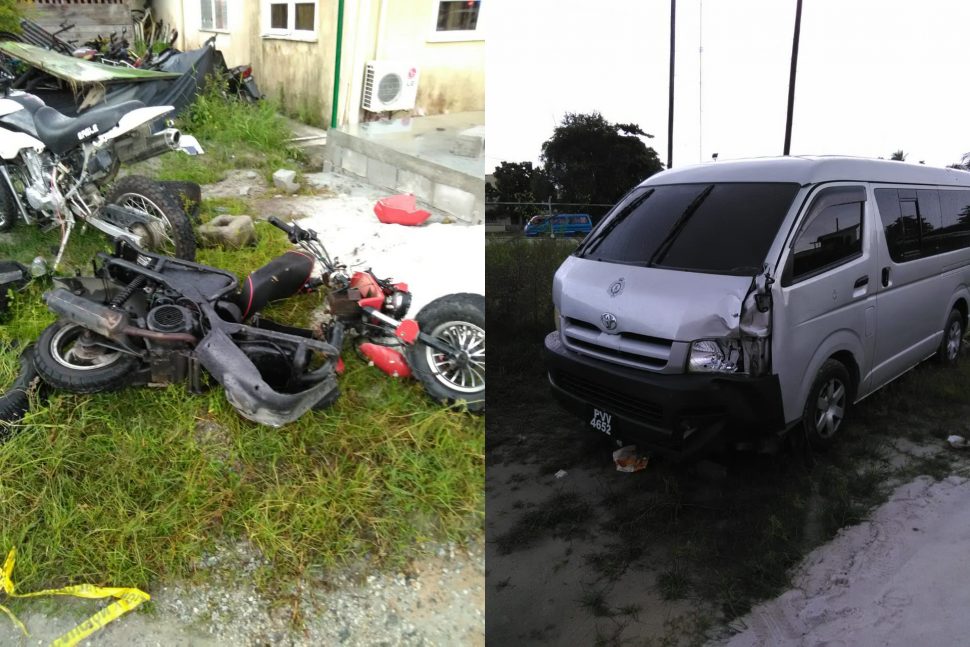President David Granger today said that he was deeply distressed by what he said was the “insane” rise in road fatalities and called on members of the public to observe the Guyana Police Force’s code of behaviour.
In a statement, the President said that twenty-one persons, including three children, died as a result of 15 road accidents in November.
He added that 114 persons, nine of whom were children, were killed in ninety-seven road accidents so far this year.
The statement by the President follows:
The deaths, disabilities and injuries and damage to property caused by accidents on our roads are deeply distressing.
I extend the sympathy of my Cabinet and Government to the relatives, families and friends of those who have been killed or injured as a result of road accidents. I wish the survivors a speedy recovery.
Road accidents represent a threat to human safety. Every accident is one too many; every death is too great a loss that our country cannot afford. The record is grave:
– Young persons between the ages of 16 and 42 years comprised more than three out of every five fatalities.
– Twenty-one persons, including three children, died as a result of 15 road accidents in November.
– One hundred and fourteen persons, nine of whom were children, were killed in ninety-seven road accidents this year.
This insane increase in road fatalities has been caused, mainly, by persons driving at excessive speeds; driving under the influence of alcohol; driving without due care and attention (or inattentiveness) and driving on roads which are congested or unsafe for other road users, particularly pedestrians, thirty of whom were killed.
I had proposed a three-point approach to road safety in my address at the launch of Road Safety Month, on the 4th November 2015. The three-point approach involved:
– more stringent enforcement of our traffic laws including those proscribing driving under the influence of alcohol, playing distracting music and the use of cellular phones while driving; stricter enforcement will help to promote greater safety on the roads; regular and rigorous patrols of notorious, high-risk zones must be conducted during daylight and at night; speed limits and limitations on the lawful complement of cargo and passengers by commercial and public transportation vehicles, must be established;
– greater road safety education through a systematic and sustained countrywide campaign must be conducted; the drivers’ licensing process must be strengthened to ensure that only competent and responsible persons are certified to drive vehicles, especially passenger vehicles, on roadways; passengers, themselves, have a primary interest in their own safety and should ensure that the vehicles in which they are travelling are not overloaded, speeding or playing excessively loud music; and
– improved engineering solutions to ensure safer roadways, many of which were never intended to be highways or public roads; some must be “re-engineered” for safety by clearer signage and markings, including conspicuous pedestrian ‘zebra’ crossings and lane lines which must be visible on all roads; sidewalks, pavements and overpasses, where possible, must be installed to ensure pedestrian safety; no-parking zones and bus stops must be marked; traffic signals should be maintained in working condition and traffic policemen must be deployed at high-risk zones to deter lawlessness and direct the safe flow of traffic on urban and rural roadways during peak hours and, particularly, during the most deadly days and nights – Fridays, Saturdays and Sundays.
I urge all road-users to observe the Guyana Police Force’s code of behaviour – care, caution, consideration, common sense and courtesy – as they drive on our roadways.
I am confident that the Government, Police Force, non-governmental organisations – such as Regional Road Safety Associations – and civil society could combine their efforts to make road use safe for everyone.






